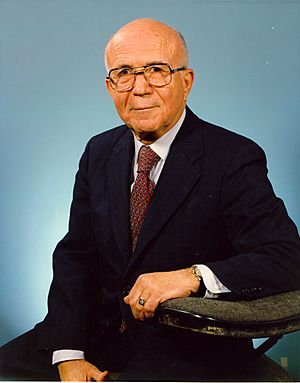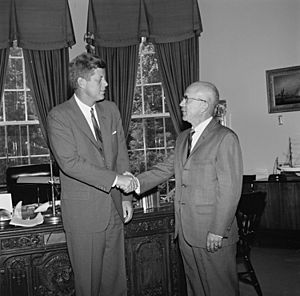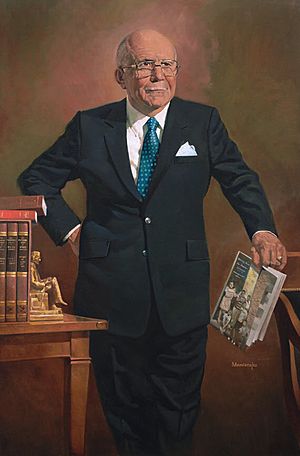Augustus Hawkins facts for kids
Quick facts for kids
Augustus Hawkins
|
|
|---|---|
 |
|
| Member of the U.S. House of Representatives from California |
|
| In office January 3, 1963 – January 3, 1991 |
|
| Preceded by | Edgar W. Hiestand (redistricted) |
| Succeeded by | Maxine Waters |
| Constituency | 21st district (1963–1975) 29th district (1975–1991) |
| Member of the California State Assembly from the 62nd district |
|
| In office January 7, 1935 – January 3, 1963 |
|
| Preceded by | Frederick Madison Roberts |
| Succeeded by | Tom Waite |
| Personal details | |
| Born |
Augustus Freeman Hawkins
August 31, 1907 Shreveport, Louisiana, U.S. |
| Died | November 10, 2007 (aged 100) Bethesda, Maryland, U.S. |
| Political party | Democratic |
| Spouses | Pegga Smith (1945–1966) Elsie Hawkins (1977–2007) |
| Education | University of California, Los Angeles (BA) |
Augustus Freeman Hawkins (August 31, 1907 – November 10, 2007) was an American politician. He was a member of the Democratic Party. Hawkins served in the California State Assembly from 1935 to 1963. Later, he joined the U.S. House of Representatives from 1963 to 1991.
During his long career, Hawkins helped create over 300 state and federal laws. Two of his most famous laws are Title VII of the Civil Rights Act of 1964 and the 1978 Humphrey-Hawkins Full Employment Act. People called him the "silent warrior" because he worked hard for education and to end unemployment.
Contents
Early Life and Family
Augustus Hawkins was born in Shreveport, Louisiana. He was the youngest of five children. In 1918, his family moved to Los Angeles, California.
He finished Jefferson High School in 1926. Then, he earned a bachelor's degree in economics from the University of California, Los Angeles in 1931. Hawkins wanted to study civil engineering. However, the Great Depression made it hard for him to afford his dream. This experience made him interested in politics and helping others. He also became very dedicated to improving education.
After college, Hawkins ran a real estate business with his brother. He also studied government. While working in the California State Assembly, he married Pegga Adeline Smith in 1945. She passed away in 1966. Later, Hawkins married Elsie Taylor in 1977. He lived in the Washington area until his death.
Augustus Hawkins was African American, but he had light skin. People sometimes thought he was white. However, he always made it clear that he was Black and proud of his heritage.
Political Career
Serving in the State Assembly
Augustus Hawkins served in the California State Assembly when there were very few Black politicians. Black people often had to work with white politicians to make changes. Hawkins was one of the only Black political leaders in Los Angeles at that time.
He was part of a big change where many African Americans started supporting the Democratic Party. Unlike most Black voters then, Hawkins supported Franklin D. Roosevelt for president in 1932. He liked Roosevelt's "New Deal" programs, which were popular with many Americans, including African Americans.
In 1934, Hawkins won his election. He defeated Frederick Madison Roberts, who was the first African American in the California State Assembly. Hawkins served as a Democrat in the Assembly from 1935 to 1963. By the time he left, he was the longest-serving member.
Hawkins's district had many Latino American and African American residents. While in the Assembly, he worked on laws to stop unfair housing and employment practices. He also pushed for affordable housing and disability insurance. He even helped domestic workers get workers' compensation. Although he didn't always get support, he passed a fair housing law. This law stopped builders who received federal money from discriminating.
In 1958, Hawkins tried to become the Speaker of the California State Assembly. This was a very powerful position. He didn't win, but he became chairman of an important committee. If he had won, he would have been the first African American Speaker in California.
In 1962, Hawkins won an election for a new congressional district in Los Angeles. With support from John F. Kennedy, he won easily. He said it felt like "shifting gears" from being the oldest member in the Assembly to a new member in Congress.
Working in the U.S. Congress
From 1963 to 1991, Hawkins represented parts of Los Angeles County in Congress. He almost always won his elections with more than 80% of the votes. He was the first Black representative elected from west of the Mississippi River.
Hawkins strongly supported President Lyndon B. Johnson's "Great Society" programs. Early in his time in Congress, he helped write Title VII of the Civil Rights Act of 1964. This part of the law created the Equal Employment Opportunity Commission. This group helps prevent job discrimination. Hawkins also traveled through the South in 1964 to encourage African Americans to register to vote.
Five days after the Voting Rights Act of 1965 became law, the Watts Riots happened in Hawkins's district. These were serious riots in Los Angeles. Hawkins asked Congress to provide more money to fight poverty. However, he did not support the violence. The riots made it harder to pass fair housing laws.
Hawkins first agreed with President Johnson about the Vietnam War. But as the war continued, he became more critical. After visiting South Vietnam in 1970, Hawkins and another representative spoke out. They urged Congress to condemn the "cruel and inhumane treatment" of prisoners there. They had visited a prison on Con Son Island and described the terrible conditions.
Hawkins was one of the first members of the Congressional Black Caucus. This group is made up of African American members of Congress. Hawkins focused on passing laws rather than just speaking out. He believed in clear thinking for the civil rights movement. He also worked to restore honorable discharges to 170 Black soldiers. These soldiers had been wrongly accused of a disturbance in Texas in 1906.
Besides the Civil Rights Act, Hawkins helped pass other important laws:
- The 1974 Juvenile Justice and Delinquency Prevention Act: This law protects young people who are involved in the criminal justice system.
- The 1978 Pregnancy Disability Act: This law aimed to stop discrimination against women because of pregnancy. Hawkins said it would help ensure "genuine equality in the American labor force."
- The 1978 Humphrey-Hawkins Full Employment Act: Hawkins worked with Senator Hubert Humphrey on this law. It set a goal for the U.S. government to provide full employment. It also required the head of the Federal Reserve Board to report to Congress on the economy.
- The Job Training Partnership Act of 1982: This law helped people get job training.
- The 1988 School Improvement Act: This law aimed to improve schools.
In 1984, Hawkins became the chairman of the United States House Committee on Education and Labor.
Hawkins faced challenges during the 1980s. Presidents Ronald Reagan and George H. W. Bush were more conservative. Even some members of his own party thought his ideas were old-fashioned. His biggest disappointment was when President George H. W. Bush vetoed the Civil Rights Act of 1990. This law would have reversed Supreme Court decisions that made it harder for minorities or women to prove job discrimination. It was the only time a civil rights act was successfully vetoed in U.S. history. Hawkins retired in 1991. A less strong civil rights bill was passed after he retired.
Later Life
Augustus Hawkins retired in 1991. He had never lost an election in 58 years as a politician. He lived in Washington, D.C., for the rest of his life. He passed away at the age of 100. He was one of the oldest people to have served in Congress.
Legacy
The Augustus F. Hawkins Nature Park was built in 2000 in Los Angeles. It is an 8.5-acre park with a discovery center.
Augustus F. Hawkins High School in Los Angeles opened in 2012. It is named in his honor.
See Also
 | Stephanie Wilson |
 | Charles Bolden |
 | Ronald McNair |
 | Frederick D. Gregory |



